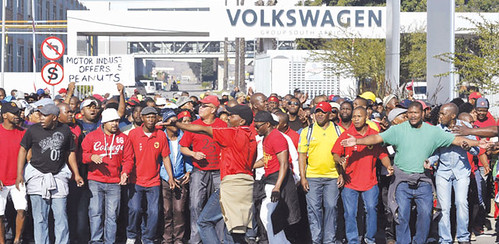
Autoworkers strike in South African on August 21, 2013. The country has been hit by labor strife over the last year., a photo by Pan-African News Wire File Photos on Flickr.
SA ‘will pay heavy price’ for strike
August 21, 2013
Pretoria. – Labour experts warned on Monday that lost production and revenue estimated at R700 million a day in the automotive sector would outstrip any material gains of striking workers as up to 30 000 of them downed tools across South Africa.In addition, the country would suffer debilitating reputational damage as much of the vehicle production was for export to overseas markets, in line with the government’s industrial focus.
The National Union of Metalworkers of South Africa said the strike was in “full swing” and production had halted at all of the seven major motor manufacturers represented in the country.
These comprise BMW, Mercedes-Benz, Toyota, General Motors, Volkswagen, Nissan and Ford, and include some truck and bus makers. This meant that vehicle output of about 3 000 units a day in South Africa had been affected.
Numsa said one of the truck manufacturers, MAN Truck and Bus SA, had tried to break the strike through the use of “scab labour” and the police, but its spokesman said workers had walked off production lines and operations had halted.
The National Association of Automobile Manufacturers of South Africa had estimated losses to be about R600 million a day, which included the negative effect on downstream manufacturing, including automotive components.
But the body’s director, Nico Vermeulen, said on Monday the association estimated only 18 000 workers were on strike.
Volkswagen SA spokesman Matt Gennrich said most workers on the morning shift at its Uitenhage plant had stayed away from work.
BMW SA spokesman Guy Kilfoil confirmed that production of about 345 3-Series sedans a day was halted at the car maker’s Rosslyn plant, near Pretoria.
“The strike has started, it’s in full swing,” said Alex Mashilo, chief negotiator for the vehicle sector of Numsa. Workers wanted a 14 percent increase across the board.
Mr Mashilo said the Automobile Manufacturers’ Employers Organisation was offering 8 percent.
Labour economist Loane Sharp at employment services company Adcorp said the wage negotiations in the vehicle sector had added a “layer of complexity” to collective bargaining in South Africa. The mining, transport and metals sectors have seen violent strikes following last year’s shooting of mine workers by police at Marikana.
Tony Healy, of national labour law consultancy Tony Healy and Associates, said the strike was in the context of the Congress of South African Trade Unions losing ground to rivals unions. “Probably what’s so worrying is the gap between the parties (in the automotive sector) is so big.”
More profitable companies in South Africa were more prone to industrial action over wages, Healy said. In this case Numsa wanted better medical aid conditions and improved shift-work flexibility for its members.
Sharp said Numsa would likely take the opportunity to “flex its muscles” and reach a high wage settlement agreement. This could prolong the strike.
On the other hand, employers might be looking to settle as soon as possible, he said. “While they (car manufacturers) would like to complain . . . they are significant beneficiaries of tariff protection.”
Department of Trade and Industry director-general Lionel October said government support for South Africa’s automotive sector was less favourable compared with Brazil, South Korea or Europe. The government was willing to offer support, and already did, to anybody who was willing to invest.
South Africa offered very low levels of tariff protection compared with many other countries, including its Brics partners. “It is possible to completely separate the auto industry incentive regime and (this) labour unrest,” October said.
– AFP
1 comment:
Any country which is struggling for the progress, strikes are the poison for it. The country have to face many problems because of the one strike.
South Africa News Online
Post a Comment